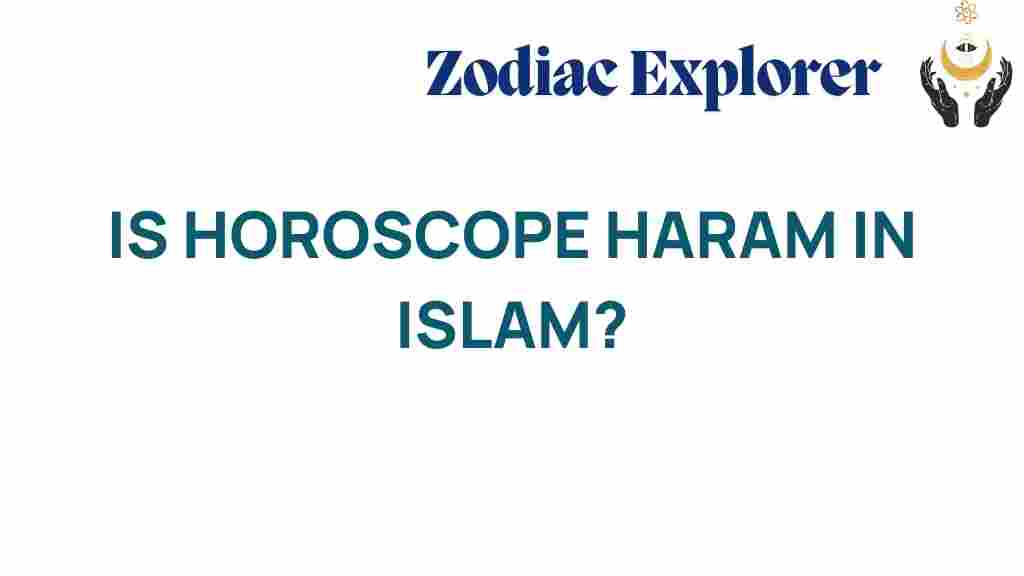Is Your Horoscope Haram? Unpacking the Controversy in Islam
The practice of horoscopes and astrology has sparked significant debate within the Muslim community. With a rich tapestry of beliefs and cultural perspectives, the question of whether horoscopes are considered haram (forbidden) in Islam is critical for many. This article aims to unpack this controversy, exploring religious views, spiritual beliefs, and the broader implications of astrology within the context of Islam.
Understanding Astrology and Horoscopes
Astrology is an ancient belief system that suggests a connection between celestial phenomena and human affairs. Horoscopes are a key component of astrology, providing insights based on the positions of celestial bodies at the time of a person’s birth. These insights often include predictions about personality traits, life events, and future occurrences.
The term “horoscope” itself derives from the Greek words “hora” (time) and “scopos” (observer), indicating a system that observes celestial events to provide interpretations about life on Earth. As astrology has evolved, it has found its way into various cultures, each interpreting it through their unique lens.
The Islamic Perspective on Astrology
In Islam, the belief in astrology and horoscopes is a contentious issue. The Quran and Hadiths (sayings of the Prophet Muhammad) provide guidance on various matters, including beliefs about fate and divine will. Many scholars interpret certain verses and teachings to suggest that seeking knowledge from celestial bodies can detract from a person’s faith in Allah’s will.
- Quranic Verses: Some scholars refer to verses in the Quran that emphasize the power and knowledge of Allah, which could imply that attempting to predict the future through horoscopes is inappropriate.
- Hadiths: Various Hadiths warn against seeking knowledge from soothsayers and astrologers, deeming it an act of disbelief.
These interpretations lead many Muslims to believe that horoscopes are haram, as they divert attention from trusting in Allah’s plan and may encourage reliance on supernatural forces.
Debate Among Scholars and Believers
The debate surrounding horoscopes in Islam is not uniform. Some scholars argue that while astrology in its traditional form may be haram, there can be a distinction between astrology and personality assessments that are based on general characteristics associated with birth dates.
- Proponents: Some believers argue that horoscopes can serve as a tool for self-reflection and personal growth, offering insights into one’s character and potential challenges.
- Opponents: Others maintain that engaging with horoscopes, even as a form of entertainment, can lead to a slippery slope that ultimately undermines one’s faith.
This division among scholars leads to varying beliefs within the Muslim community regarding the acceptability of horoscopes.
Cultural Perspectives on Horoscopes
Different cultures within the Muslim world have their unique relationships with astrology and horoscopes. In some regions, such as parts of South Asia and the Middle East, astrology is deeply ingrained in cultural practices and daily life. People often consult astrologers for guidance on marriage, business, and other significant life decisions.
Conversely, in more conservative Islamic societies, embracing horoscopes may be viewed as a departure from religious teachings. This cultural divide reflects a broader tension between traditional beliefs and modernity.
Spirituality and Personal Beliefs
For many, spirituality is a personal journey that may incorporate various elements, including astrology. Individuals may find comfort and guidance in horoscopes, viewing them as a way to connect with the universe and understand their place within it. This highlights a critical aspect of the ongoing debate: personal belief systems and the search for meaning.
While some Muslims may reject horoscopes outright due to religious teachings, others may adopt a more nuanced view, incorporating elements of astrology into their spirituality without compromising their faith.
Step-by-Step Process to Understand Your Position on Horoscopes
If you are struggling with the question of whether horoscopes are haram for you personally, consider the following steps:
- Research: Explore both Islamic teachings and scholarly opinions on astrology and horoscopes. Resources such as Islamic scholarly articles can provide valuable insights.
- Reflect: Think about your beliefs and how they align with your understanding of spirituality. What role do horoscopes play in your life?
- Consult: If you have questions, consider speaking with a knowledgeable religious leader or scholar who can provide guidance tailored to your context.
- Evaluate: Assess the impact of horoscopes on your faith and daily life. Do they enhance your understanding of yourself, or do they create confusion regarding your beliefs?
As you navigate the complexities of astrology and horoscopes within the framework of Islam, here are some tips to consider:
- Stay Informed: Keep abreast of different scholarly opinions and interpretations within the Islamic community regarding horoscopes.
- Engage in Discussions: Join community forums or discussion groups to hear diverse perspectives and share your thoughts.
- Practice Critical Thinking: Approach horoscopes with a critical mindset, considering their implications on your faith and spirituality.
- Seek Balance: Find a harmonious way to integrate your interests in astrology with your commitment to Islamic principles.
Conclusion
The question of whether horoscopes are haram in Islam is complex and multifaceted. It encompasses a range of beliefs, scholarly interpretations, and cultural perspectives. While many Muslims may view horoscopes as incompatible with their faith, others may find value in them for personal reflection and growth.
Ultimately, each individual must navigate this debate according to their beliefs and understanding of Islam. Engaging thoughtfully with both religious teachings and personal experiences can lead to a deeper understanding of spirituality and one’s relationship with astrology.
As you explore the intersection of horoscopes and Islam, remember to remain open-minded and respectful of differing views within the community. For further reading on spiritual perspectives in Islam, visit Islamic spirituality resources.
This article is in the category Myths and created by ZodiacExplorer Team
